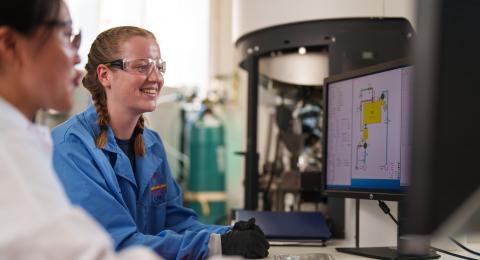The Chemistry (B.S.) major at UNH is a vigorous chemical exploration in the intricacies of inorganic, organic, physical and analytical chemistry. Here, you’ll do this by immersing yourself in state-of-the-art laboratory sessions with personalized guidance from esteemed faculty, while also having access to ample real-world research opportunities. All this is designed to build skills that prepare you for a profession as a chemist in a myriad of fields or pursuing graduate education in chemistry, pharmaceutical sciences or material sciences.
What is a Bachelor of Science in chemistry?
This comprehensive program prepares students for success as professional chemists in industry and can also serve as a strong foundation for graduate studies in chemistry or related fields like materials science and pharmaceutical sciences. The B.S. degree provides rigorous training in chemistry’s traditional sub-disciplines (analytical, inorganic, organic and physical). Students gain laboratory experience in molecular synthesis and characterization, analytical and instrumental methods, physical chemical measurements and data analysis, and spectroscopy. Students also participate in scientific inquiry (via independent advanced laboratory and research experiences), which builds the communication, critical-thinking and problem-solving skills necessary for success in many careers. Students considering graduate degrees in chemistry should consider the Bachelor of Science degree.
Why study chemistry at UNH?
You’ll engage in a program of study approved by the American Chemical Society that explores a dynamic, creative and practical discipline. You’ll find a program small enough to be personal but comprehensive enough to provide excellent opportunities for challenge and growth, like independent research, leadership and peer-mentoring. You’ll have access to newly renovated laboratories, state-of-the-art equipment and faculty committed to transformative experiences for undergraduate students. Our graduates pursue careers in industry, go on to attend M.S. and Ph.D. programs and find success in environmental and health-related professions, making public policies, patent law and intellectual property, and educating future generations of scientists.
Potential careers
- Agricultural and food products
- Biotechnology
- Chemical analysis and quality control
- Chemical/pharmaceutical sales and marketing
- Chemical research and development
- Chemistry teacher
- Health professions
- Patent law, intellectual property and science policy
- Pharmaceuticals and pharmacology
- Plastics and coatings
- Science/technology writing
- Toxicology and forensic science
Curriculum & Requirements
The B.S. Chemistry degree is certified by the American Chemical Society and provides a deep, rigorous experience that prepares students for graduate work or a career in chemical industry and related fields. The curriculum offers thorough training in the major fields of chemistry, covering analytical, inorganic, organic, and physical chemistry, as well as biochemistry and chemical biology. Students gain laboratory experience in molecular synthesis and characterization, chemical biology, analytical and instrumental methods, physical chemical measurements and data analysis, and spectroscopy. At the same time, the program requires students to participate in scientific inquiry, via both advanced laboratory experiences and independent research.
Sample Degree Plan
This sample degree plan serves as a general guide; students collaborate with their academic advisor to develop a personalized degree plan to meet their academic goals and program requirements.
| First Year | ||
|---|---|---|
| Fall | Credits | |
| CHEM 400 | Freshman Seminar | 1 |
| CHEM 403 | General Chemistry I | 4 |
| MATH 425 | Calculus I | 4 |
| PHYS 407 | General Physics I | 4 |
| Discovery Course | 4 | |
| Credits | 17 | |
| Spring | ||
| CHEM 404 | General Chemistry II | 4 |
| MATH 426 | Calculus II | 4 |
| ENGL 401 | First-Year Writing | 4 |
| PHYS 408 | General Physics II | 4 |
| Credits | 16 | |
| Second Year | ||
| Fall | ||
| CHEM 517 | Introduction to Chemical Measurement Science | 3 |
| CHEM 518 | Practical Chemical Measurement Techniques and Instrumentation | 2 |
| CHEM 547 | Organic Chemistry I | 3 |
| CHEM 549 | Organic Chemistry Laboratory | 2 |
| Discovery Course | 4 | |
| Discovery Course | 4 | |
| Credits | 18 | |
| Spring | ||
| CHEM 548 | Organic Chemistry II | 3 |
| CHEM 550 | Organic Chemistry Laboratory | 2 |
| CHEM 574 | Chemistry Across the Periodic Table | 4 |
| CHEM 576 | Experimental Inorganic Chemistry | 2 |
| Discovery Course | 4 | |
| Credits | 15 | |
| Third Year | ||
| Fall | ||
| CHEM 683 | Physical Chemistry I | 3 |
| CHEM 685 | Physical Chemistry Laboratory | 2 |
| CHEM 774 | Inorganic Chemistry | 3 |
| CHEM 755 | Advanced Organic Chemistry | 3 |
| CHEM 777 | Advanced Synthesis and Characterization | 3 |
| Discovery Course | 4 | |
| Credits | 18 | |
| Spring | ||
| CHEM 684 | Physical Chemistry II | 3 |
| CHEM 686 | Physical Chemistry Laboratory | 2 |
| CHEM 762 | Advanced Chemical Analysis Instrumentation | 3 |
| CHEM 763 | Advanced Chemical Instrumentation Laboratory | 2 |
| Elective Course | 4 | |
| Discovery Course | 4 | |
| Credits | 18 | |
| Fourth Year | ||
| Fall | ||
| CHEM 776 | Physical Chemistry III (Not offered every year. Can take CHEM 708 or CHEM 740 are Chem elective equivalent) | 3 |
| CHEM 799 | Senior Thesis (first semester of a yearlong experience) | 4 |
| BMCB 658 or CHEM 740 | General Biochemistry or Chemical Biology | 3 |
| Elective Course (1 course at 4 credits or 2 Electives at 4 credits each if not taking BMCB 658) | 4 | |
| Credits | 14 | |
| Spring | ||
| Elective Course | 4 | |
| Elective Course | 3 | |
| CHEM 798 | Senior Seminar | 1 |
| CHEM 799 | Senior Thesis | 4 |
| Credits | 12 | |
| Total Credits | 128 | |
Degree Requirements
All Major, Option and Elective Requirements as indicated.
*Major GPA requirements as indicated.
Major Requirements
| Code | Title | Credits |
|---|---|---|
| Required Courses | ||
| CHEM 400 | Freshman Seminar | 1 |
| CHEM 403 | General Chemistry I | 4 |
| CHEM 404 | General Chemistry II | 4 |
| CHEM 517 & CHEM 518 | Introduction to Chemical Measurement Science and Practical Chemical Measurement Techniques and Instrumentation | 5 |
| CHEM 547 & CHEM 549 | Organic Chemistry I and Organic Chemistry Laboratory | 5 |
| CHEM 548 & CHEM 550 | Organic Chemistry II and Organic Chemistry Laboratory | 5 |
| CHEM 574 & CHEM 576 | Chemistry Across the Periodic Table and Experimental Inorganic Chemistry | 6 |
| BMCB 658 | General Biochemistry 1, 3 | 3 |
| or CHEM 740 | Chemical Biology | |
| CHEM 683 & CHEM 685 | Physical Chemistry I and Physical Chemistry Laboratory | 5 |
| CHEM 684 & CHEM 686 | Physical Chemistry II and Physical Chemistry Laboratory | 5 |
| CHEM 755 | Advanced Organic Chemistry | 3 |
| CHEM 762 & CHEM 763 | Advanced Chemical Analysis Instrumentation and Advanced Chemical Instrumentation Laboratory | 5 |
| CHEM 774 | Inorganic Chemistry | 3 |
| CHEM 776 | Physical Chemistry III | 3 |
| CHEM 777 | Advanced Synthesis and Characterization | 3 |
| CHEM 798 | Senior Seminar | 1 |
| CHEM 799 | Senior Thesis 2 | 8 |
| MATH 425 | Calculus I | 4 |
| MATH 426 | Calculus II | 4 |
| PHYS 407 | General Physics I | 4 |
| PHYS 408 | General Physics II | 4 |
| Total Credits | 85 | |
- 1
BMCB 658 General Biochemistry and CHEM 740 Chemical Biology each satisfy the Discovery Biological Sciences requirement (BS Chemistry majors only).
- 2
CHEM 799 Senior Thesis is a year-long experience of 4 credits per semester and satisfies the Discovery Capstone Experience requirement.
- 3
CHEM 740 Chemical Biology meets the ACS BIOCHEM requirement.
Program Learning Outcomes
- Reason with Chemistry’s anchoring concepts: that matter consists of atoms that have internal structures that dictate their chemical and physical behavior; that atoms interact via electrostatic forces to form chemical bonds that chemical compounds have geometric structures that influence their chemical and physical behaviors; that intermolecular forces—electrostatic forces between molecules—dictate the physical behavior of matter; that matter changes, forming products that have new chemical and physical properties that energy is the key currency of chemical reactions in molecular scale systems as well as macroscopic systems; that chemical changes have a time scale over which they occur; that all chemical changes are, in principle, reversible, and chemical processes often reach a state of dynamic equilibrium; that Chemistry is generally advanced via experimental observations; and that Chemistry constructs meaning interchangeably at the particulate and macroscopic levels.
- Use Chemistry’s cross-cutting concepts to interrogate and explain phenomena: chemical identity (how do we identify chemical substances?); structure-property relationships (how do we predict the properties of materials?); chemical causality (why do chemical processes occur?); chemical mechanism (how do chemical processes occur?); chemical control (how can we control chemical processes?); benefits-costs-risks (how do we evaluate the impacts of chemically transforming matter?).
- Demonstrate the following general scientific practices when displaying knowledge of chemical ideas and concepts: asking questions; developing and using models; constructing explanations; planning and carrying out investigations; engaging in argument from evidence; analyzing and interpreting data; using mathematics and computational thinking; obtaining, evaluating, and communicating information OR demonstrate the following Chemistry core practices when displaying knowledge of chemical ideas and concepts (a) analysis: development and application of strategies for detecting, identifying, separating, and quantifying chemical substances (b)synthesis: the design of new substances and synthetic routes (c)transformation: controlling chemical processes for non-synthetic purposes.
Explore Program Details
Parsons Hall Emergency Operations Plan
Resources
Chemistry Stockroom, Instrumentation, Chemistry Library, Chemistry Hygiene Plan
Those interested in the Chemistry (B.S.) major may also be interested in the following advanced degrees. Students in the program also have the opportunity to participate in the UNH accelerated master’s program.
















